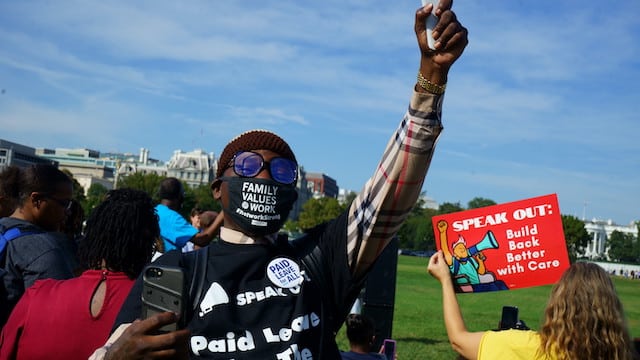A Mother’s Day Wish: 21st Century Workplace Policies

My husband normally doesn’t participate in the media interviews I do. But three decades ago, when our kids were 2 and 5, a conservative woman wrote an op-ed in the local paper declaring all problems in the family, from alcoholism to teenage suicide, were due to mothers working outside the home.
A public television station asked me to debate her on air. I said sure. The woman would go on only if her husband joined her. Would my husband do the same? I said sure.
The show was a live broadcast at 7 p.m. on a weekday, so we had to get a babysitter. As we waited for her, my older son, Nat, asked, “Why aren’t there any boy babysitters?” I assured him there were and that he and his brother could do that job when they got old enough. But I agreed, most babysitters were girls because in many families, dads didn’t share caring for kids.
“That’s what you and Daddy are going to talk about on that show tonight,” he declared. I hugged him and rejoiced at what an advanced 5-year-old we had.
Once on the show, my opponent described her volunteer work at a local school and how angry she was at the mothers who didn’t come to pick up their kids when the school called to say they were sick.
“I’m angry, too,” I said. “But why are you angry at the moms and not at the boss who would fire them or dock their pay if they answered that call? And how about the dads — don’t they also fret when they have an ailing kid?”
And so it went. Our husbands didn’t get a chance to speak — until near the end, when Larry found an opening.
“Men should be so thankful to the women’s movement,” he said, “for giving us parenting. It’s a huge responsibility but it’s such a joy. We should just say thanks.”
At the time, Larry worked in a factory making cables for MRI machines. Many of his co-workers split shifts with their wives. They were used to cooking and caring for children — it’s what you did. Those dads might not describe parenting the same way Larry did, but many were devoted to their kids and hated the lack of paid leave.
We couldn’t wait to get home to see the kids’ reactions. Nat informed us that their favorite show, “Greatest American Hero,” happened to be on at the same time, and that’s what they watched. “But we turned to your show during the commercials!” he said.
“What was your favorite part?” I was hoping he’d gotten to see that segment with his dad.
“When the words went over your faces at the end,” he said. “That was really cool.”
A few years later, my husband got laid off, went to college and became a high school teacher — where he saw how many students missed school to stay home with a sick sibling because a parent wasn’t allowed to. Today, we’re still fighting for men to share parenting and for all workers to be able to be good parents without being docked their pay or risking their job.
The good news is, three states and 18 cities in the U.S. now have enacted laws guaranteeing that workers can earn paid sick days. That number will go up soon. Three states have family and medical leave insurance programs so dads as well as moms can bond with a new baby — or care for a serious personal or family illness, and that number will also grow. Federal bills have been introduced. Voters care deeply. Candidates are realizing we can’t have family values if we don’t value families at work.
Best of all, moms and dads all over the country are realizing these are shared problems. The workplace needs to move into the 21st century — and we’re the ones to make that change happen.
Ellen Bravo is executive director of Family Values @ Work, a network of coalitions in 21 states that work for policies such as paid sick days and family and medical leave insurance.